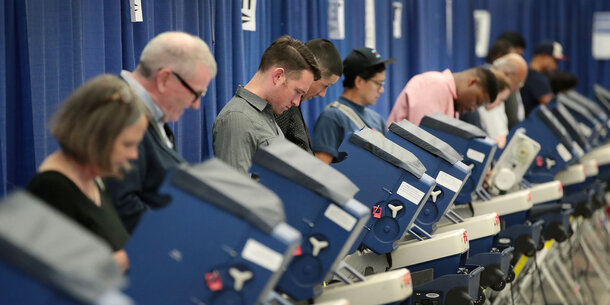On October 4, the Supreme Court will hear oral argument in Merrill v. Milligan, a closely-watched case where Black voters and civil rights groups in Alabama challenged the state’s new congressional district map for discrimination under Section 2 of the Voting Rights Act of 1965 and the Constitution. After the lower court ruled in favor of plaintiffs on their Section 2 claims, the Supreme Court granted review to revisit the applicable legal standards for applying the Voting Rights Act to redistricting.
Section 2 prohibits states and localities from drawing districts or maintaining election systems that have a discriminatory effect no matter the underlying intent of map drawers, requiring states to redraw maps that deny voters of color an equal opportunity to participate in the political process and to elect candidates of choice.
In 1986, the Supreme Court set out a test for proving Section 2 claims in Thornburg v. Gingles. To succeed under the rigorous and fact-intensive Gingles framework, plaintiffs must prove that white voters who form an electoral majority consistently vote to block minority-preferred candidates and that these political dynamics and the configuration of the challenged district combine with a history of discrimination to deny minority voters equal political opportunity. They also must show that it is possible to draw a reasonably configured alternative that would not result in vote dilution.
The Gingles framework has helped significantly increase electoral opportunities for minority communities. But with Merrill, the Supreme Court will decide whether to recalibrate the long-standing Gingles framework and to limit the reach of the Voting Rights Act.
Underscoring the importance of the case are 37 friend-of-the-court briefs that have been filed from a broad range of voting rights groups and Voting Rights Act practitioners, political scientists, law professors, former and current elected officials and community leaders, political and lobbying groups, among others. In all, 22 of these briefs have been filed in support of plaintiffs, 14 in support of Alabama, and 1 in support of neither side.
The Brennan Center has prepared this annotated guide summarizing each brief’s most prominent points or unique contributions.
Briefs Discussing the Gingles Framework’s Workability and Consistency with Congressional Intent and the Constitution
- Brief of the Brennan Center for Justice in Support of Plaintiffs
Our brief urges the Supreme Court to uphold the lower court’s decision and focuses on the narrow but critical role that Section 2 of the Voting Rights Act plays in redistricting. Specifically, it argues that the Gingles test is carefully calibrated to identify actual discrimination where minority voters are paired with a hostile, white majority that will not engage in political coalition building, thereby locking them out of the political process. Under this framework, states can avoid liability in a number of ways short of drawing majority-minority districts, and multiple safeguards exist to ensure that race is considered within permissible bounds. Debevoise & Plimpton LLP joined the Brennan Center as co-counsel on this brief.
- Brief of the United States in Support of Plaintiffs
This brief from the United States focuses on the lower court’s application of the Voting Rights Act to the undisputed facts of the case. It also argues that Gingles gives appropriate effect to Congress’s intent in enacting Section 2 of the Voting Rights Act and that the novel interpretation offered by Alabama is inconsistent with the text, history, and judicial interpretation of the statute. The Department of Justice is counsel on this brief.
- Brief of Lawyers Committee for Civil Rights Under Law, the Leadership Conference on Civil and Human Rights, the Leadership Conference Education Fund, and Asian American Legal Defense and Education Fund in Support of Plaintiffs
This brief from civil rights organizations with significant Voting Rights Act experience illustrates how the framework set out in Gingles has provided courts with a fair and workable framework to determine when race discrimination in redistricting occurs. Specifically, it argues that Gingles faithfully operationalizes the intent behind Section 2 and is consistent with the Fourteenth and Fifteenth Amendments of the Constitution. Lawyers’ Committee and Dechert LLP are counsel on this brief.
- Brief of Voting Rights Practitioners in Support of Plaintiffs
This brief from election law practitioners discusses the importance of Section 2 and calls attention to the Supreme Court’s Shelby County v. Holder decision, where the Court implied that now-defunct Section 5 was unnecessary because of the availability and effectiveness of Section 2. Wilmer Cutler Pickering Hale and Dorr LLP is counsel on this brief.
- Brief of American Bar Association in Support of Plaintiffs
This brief from the American Bar Association argues that Section 2 is a constitutional exercise of Congress’s power and that the test proposed by Alabama would not advance the intent of the Voting Rights Act. The American Bar Association and O’Melveny & Myers LLP are counsel on this brief.
Briefs Discussing the Legislative and Legal History of Section 2
- Brief of Bipartisan Former Congressmembers in Support of Plaintiffs
This brief was filed by a bipartisan group of former Congress members and staffers, including those who played major roles in negotiating 1982 and 2006 amendments to the Voting Rights Act. This brief adds to the historical understanding of Section 2. Faegre Drinker Biddle & Reath LLP are counsel on this brief.
- Brief of Law Professor Travis Crum in Support of Plaintiffs
This brief from Professor Travis Crum who studies constitutional and election law explains how the Fifteenth Amendment confers broad authority to Congress to enforce voting rights and also permits the consideration of race in the redistricting context. Holwell Shuster & Goldberg LLP and Travis Crum are counsel on this brief.
- Brief of Constitutional Accountability Center in Support of Plaintiffs
This brief from the Constitutional Accountability Center explains how the text and history of the Fifteenth Amendment gave Congress broad enforcement power to protect minority voting rights. It further describes how the Voting Rights Act has furthered this purpose. Constitutional Accountability Center is counsel on this brief.
Briefs Discussing the Administrative Workability of Section 2
- Brief of 20 States and the District of Columbia in Support of Plaintiffs
This brief from 20 states (New York, California, Colorado, Connecticut, Delaware, Hawaii, Illinois, Maine, Maryland, Massachusetts, Michigan, Minnesota, Nevada, New Jersey, Oregon, Pennsylvania, Rhode Island, Vermont, Washington, and Wisconsin) and the District of Columbia responds to the brief from 14 states lead by Louisiana and argues that Alabama’s proposed Section 2 standard would be unworkable and burdensome. It also discusses how decades-long reliance by states on the Gingles framework counsels in favor of maintaining the current test. The Office of the Attorney General for the District of Columbia and Office of the Attorney General for New York are counsel on this brief.
- Brief of Republican Former Governors in Support of Plaintiffs
This brief from former Republican Governors Arnold Schwarzenegger, William Weld, and Christine Todd Whitman urges the Court to preserve the integrity of Section 2 of the VRA and to guard against the harm of minority vote dilution. It explains that the Gingles test is already carefully drawn to respect and protect local autonomy by constraining state and local authority only when necessary to protect minority vote dilution. Cooley LLP, States United Democracy Center, and Jonathan L. Williams P.A. are counsel on this brief.
- Brief of Local Governments in Support of Plaintiffs
This brief from 28 local governments across the U.S. explains how Gingles provides clear guidance for Voting Rights Act compliance and the test advanced by Alabama would be burdensome to administer. Public Rights Project, Morrison & Foerster LLP, and the City of Cincinnati are counsel on this brief.
- Brief of Law Professors and Political Scientists in Support of Plaintiffs
This brief from law professors and political scientists argues that the Gingles framework is difficult to satisfy. It explains that trends like desegregation and increasing white support for minority preferred candidates confines Section 2 claims to a narrow set of factual circumstances and highlights the persistent underrepresentation of communities of color. The Harvard Law School Election Law Clinic is counsel on this brief.
- Brief of Project on Fair Representation in Support of Alabama
This brief from the Project on Fair Representation, which seeks to remove the consideration of race from redistricting, argues that Gingles should be overruled, calling it an unworkable framework that conflicts with a race-blind vision of the Constitution. Boyden Gray & Associates is counsel on this brief.
Briefs Discussing the Role of Plaintiff-Produced Demonstrative Districts in Section 2 Litigation
- Brief of Campaign Legal Center in Support of Plaintiffs
This brief from the Campaign Legal Center, a nonpartisan legal advocacy organization, discusses and contextualizes the role that demonstrative districts play in Section 2 litigation. It explains that while plaintiffs were required under Bartlett v. Strickland to demonstrate that Alabama could have drawn a second majority-Black congressional district, Alabama was not required to create a majority-Black district and different remedies and not just majority-minority districts can cure Section 2 violations. Campaign Legal Center is counsel on this brief.
- Brief of Computational Redistricting Experts in Support of Plaintiffs
This brief from computational redistricting experts who program computer algorithms to draw large sets of district maps explains the limitations of these methods in the Section 2 context. It also highlights the circumstances that these algorithm-produced maps can be useful—to fine tune a remedial map’s adherence to traditional redistricting principles such as compactness and respect for political subdivisions. Jenner & Block LLP is counsel on this brief.
- Brief of Republican State Legislators in Support of Alabama
This brief from Republican state legislators who were involved in redistricting this cycle around the country argues that Section 2 plaintiffs should be required to draw demonstrative districts using only traditional districting principles. Dickinson Wright, PLLC is counsel on this brief.
- Brief of Lawyers Democracy Fund in Support of Alabama
This brief from the Lawyers Democracy Fund proposes a requirement that demonstrative districts use traditional districting principles. Baker & Hostetler LLP is counsel on this brief.
Briefs Discussing the History of Discrimination in Alabama, the Importance of the Black Belt as a Community of Interest, and Other Factual Context
- Brief of U.W. Clemon, Fred Gray, Henry Sanders, Alabama Legislative Black Caucus, and Scholars of the Political Impacts of Slavery in Support of Plaintiffs
This brief from prominent Alabama-based civil rights lawyers and leaders, the Alabama Black Legislative Caucus, and professors who study the residual impacts of slavery on the politics of the South focuses on the ongoing legacy of racial hierarchy in Alabama and the state’s unbroken history of voting-related discrimination. This brief argues that the redistricting decisions made by the legislature interact with social and historical conditions to discriminate against Black voters. Sidley Austin LLP is counsel on this brief.
- Brief of Historians in Support of Plaintiffs
This brief from 10 historians and scholars who study Alabama explains the shared identity and interests of Black Belt residents. It documents how communities in the Black Belt have a shared history rooted in slavery and sharecropping and how the region’s ongoing economic hardship, exclusion from social services, and policy needs make this a quintessential community of interest. It further explains how outward migration from the Black Belt intermingled Black Belt populations with coastal and urban counterparts. Kramer Levin Robbins Russell is counsel on this brief.
- Brief of Southern Poverty Law Center, League of Women Voters, and Stand-Up Mobile in Support of Plaintiffs
This brief from Alabama-based civil rights, good government, and voter mobilization organizations explains how the Black Belt and Mobile form a community of interest, with the many ties between them. It discusses how due to these common interests, drawing a district that connects the Black Belt with Mobile would not rely on race a predominant factor. The Southern Poverty Law Center, League of Women Voters of the United States, and Schulte Roth & Zabel LLP are counsel on this brief.
- Brief of Coastal Alabama Partnership in Support of Alabama
This brief from an organization that includes political and business leaders in Alabama’s Gulf Coast contends that plaintiffs’ demonstrative districts would split a community of interest that has its roots in European colonialism and has contemporary shared business and cultural interests. Maynard Cooper & Gale, P.C. is counsel on this brief.
- Brief of Fair Housing Centers in Support of Plaintiffs
This brief from Alabama’s fair housing centers that work to combat housing discrimination discusses how Alabama’s history of racial segregation and ongoing housing discrimination has created distinct majority-Black communities of interest. It explains how official policy action created this segregation and how contemporary forces maintain it. Relman Colfax PLLC is counsel on this brief.
- Brief of Citizens United, Citizens United Foundation, and Presidential Coalition in Support of Alabama
This brief from Citizens United and another conservative group argues that Alabama’s demographics and the geographic distribution of Black voters preclude a second Black opportunity district. Benbrook Law Group, PC is counsel on this brief.
Briefs Discussing the Need for and Desirability of Robust Section 2 Protections
- Brief of Representatives Sewell, Beatty, Meeks, and Butterfield in Support of Plaintiffs
This brief from four members of the Congressional Black Caucus from the South (including Representative Terri Sewell from Alabama), Northeast, and Midwest dispels the assertion that Section 2 promotes racial sorting and discusses how majority-minority and plurality districts have promoted cross-racial communication, integration, and bipartisan cooperation. Schnapper-Casteras PLLC are counsel on this brief.
- Brief of National Congress of American Indians in Support of Plaintiffs
This brief from the oldest and largest organization of American Indian and Alaska Native tribal governments and their members examines modern racial discrimination in Indian Country and argues that the persistent disadvantage that Native Americans face in redistricting demonstrates the ongoing need for robust Section 2 protections. The Native American Rights Fund, National Congress of American Indians, and Cozen O’Connor are counsel on this brief.
- Brief of UCLA Social Scientists in Support of Plaintiffs
This brief from social scientists at the University of California at Los Angeles describes the persistence of racially polarized voting and the significant role that race continues to play in elections. It explains the consequences of removing Section 2 protections for minority voters on the local level, where discriminatory redistricting and elections systems continue to be prevalent. The UCLA Voting Rights Project is counsel on this brief.
Briefs Asking the Supreme Court to Restrict or Limit the Scope of Section 2
- Brief of Alabama Center for Law and Liberty in Support of Alabama
This brief from the Alabama Center for Law and Liberty argues that the drawing of districts and vote dilution more generally are beyond the scope of Section 2. Alabama Center for Law and Liberty and John J. Park, Jr. are counsel on this brief.
- Brief of 14 States in Support of Alabama
This brief from 14 states (Louisiana, Arizona, Arkansas, Georgia, Indiana, Missouri, Mississippi, Montana, Nebraska, Oklahoma, South Carolina, Texas, Utah, and West Virginia) argues that the lower court placed undue emphasis on proportionality, which is inconsistent with the statutory text and the Constitution. The Louisiana Department of Justice is counsel on this brief.
- Brief of America First Legal in Support of Alabama
This brief from America First Legal argues that the application of Section 2 to anything short of intentional racial discrimination is unconstitutional. Spero Law LLC and America First Legal Foundation are counsel on this brief.
- Brief of Republican National Committee in Support of Alabama
This brief from the Republican National Committee argues that courts should raise the “totality of the circumstances” factual burden on plaintiffs and that states should be given deference to rely on traditional redistricting criteria. Dhillon Law Group, Inc. and the Republican National Committee are counsel on this brief.
- Brief of National Republican Redistricting Trust in Support of Alabama
This brief from the National Republican Redistricting Trust, an organization that advances Republican interests in state and congressional redistricting, argues that the Gingles framework is atextual and not supported by current needs. Holtzman Vogel Baran Torchinsky & Josefiak, PLLC is counsel on this brief.
- Brief of American Legislative Exchange Council in Support of Alabama
This brief from the American Legislative Exchange Council (ALEC) argues that state legislatures’ redistricting choices should stand unless the sole reasonable explanation is racial discrimination. ALEC is counsel for this brief.
- Brief of Alabama GOP Chairman in Support of Alabama
This brief from the Chairman of Alabama State Republican Executive Committee argues that partisanship should be a viable defense in Section 2 cases. The Blankenship Law Firm, LLC and Wallace, Jordan, Ratliff and Brandt, LLC are counsel on this brief.
Briefs Adding Other Relevant Factual or Legal Context
- Brief of Singleton Plaintiffs in Support of Neither Party
This brief from the plaintiffs in Singleton v. Merrill—a case that is consolidated with Milligan, but where plaintiffs asserted a constitutional claim but not one under Section 2—argues that the Alabama’s map violated the Constitution and that this claim should be considered before addressing the Section 2 claim. James Uriah Blacksher, Whatley Kallas, LLP, Penn & Seaborn, LLC, and DiCello Levitt Gutzler are counsel on this brief.
- Brief of Individual Voters, NAACP Louisiana State Conference, and Power Coalition for Equity in Support for Plaintiffs
This brief from plaintiffs in a case challenging Louisiana’s congressional map argues that the resolution of Merrill v. Milligan will impact their lower court victory and that the Supreme Court should be aware of the factual circumstances in Louisiana when resolving the challenge to Alabama’s map. The Southern Coalition for Social Justice and Paul, Weiss, Rifkind, Wharton & Garrison LLP are counsel on this brief.
- Brief of Representatives Carl Jr., Moore, Rogers, Aderholt, and Palmer in Support of Alabama
This brief from five Republican members of the Alabama delegation to the U.S. House of Representatives argues that the lower court improperly devalued the retention of district cores from last decade’s map as an overriding race-neutral factor. Spero Law LLC is counsel on this brief.
- Brief of Public Interest Legal Foundation in Support of Alabama
This brief from the Public Interest Legal Foundation argues that the lower court’s analysis of the history of discrimination in voting and role of race in the political process (part of the totality of circumstances inquiry) improperly intruded upon the state’s power to run elections and misattributed private action to state action. The Public Interest Legal Foundation is counsel on this brief.




